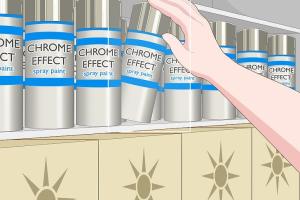Mastering the Art of Chrome Plating: A Comprehensive Guide

-
Quick Links:
- Introduction to Chrome Plating
- A Brief History of Chrome Plating
- Benefits of Chrome Plating
- Materials Needed for Chrome Plating
- Step-by-Step Chrome Plating Process
- Safety Precautions
- Expert Tips for Successful Chrome Plating
- Case Studies: Real-World Examples
- The Future of Chrome Plating
- FAQs
Introduction to Chrome Plating
Chrome plating is a process that involves depositing a layer of chromium onto a metal object to enhance its appearance and resistance to corrosion. This technique is widely used in various industries, from automotive to consumer goods, due to the aesthetic appeal and durability it provides.
A Brief History of Chrome Plating
The chrome plating process dates back to the early 20th century, where it was first utilized in the automotive industry. Over the decades, it has evolved from a luxury finish to a common practice in many manufacturing processes. Today, chrome plating is essential for the longevity and design of numerous products.
Benefits of Chrome Plating
Chrome plating offers several advantages:
- Corrosion Resistance: Protects metal surfaces from rust and wear.
- Aesthetic Appeal: Provides a shiny, mirror-like finish that enhances product appearance.
- Durability: Increases the lifespan of products.
- Easy Maintenance: Chrome-plated surfaces are easier to clean and maintain.
Materials Needed for Chrome Plating
Before starting the chrome plating process, gather the following materials:
- Base metal object (steel, aluminum, etc.)
- Chrome plating solution
- Power supply (rectifier)
- Conductive materials (copper wire)
- Protective gear (gloves, goggles, masks)
- Cleaning supplies (degreaser, sandpaper, etc.)
Step-by-Step Chrome Plating Process
The chrome plating process involves several stages:
Step 1: Preparing the Surface
Ensure the surface of the object is clean and free of contaminants. Use a degreaser and fine sandpaper to smooth out any imperfections.
Step 2: Setting Up the Equipment
Set up your power supply and connect the object to the cathode. Ensure all electrical connections are secure.
Step 3: Mixing the Chrome Plating Solution
Prepare the chrome plating solution according to the manufacturer's instructions. Proper ratios are crucial for successful plating.
Step 4: Plating Process
Submerge the object in the plating solution and turn on the power supply. Monitor the process closely to ensure even plating.
Step 5: Rinsing and Drying
Once plating is complete, rinse the object in distilled water and let it dry thoroughly.
Step 6: Finishing Touches
Inspect the plated surface for any imperfections. Buff and polish as necessary to achieve the desired shine.
Safety Precautions
Chrome plating involves hazardous materials. Always wear protective gear and work in a well-ventilated area. Follow all safety guidelines outlined by manufacturers of chemicals and equipment.
Expert Tips for Successful Chrome Plating
Here are some expert tips to enhance your chrome plating results:
- Ensure consistent voltage throughout the plating process.
- Use high-quality chrome plating solutions for best results.
- Regularly clean and maintain your equipment.
- Keep a close eye on the temperature of the plating solution.
- Practice on scrap pieces before plating a final product.
Case Studies: Real-World Examples
To understand the impact of chrome plating, let’s look at a few case studies:
Case Study 1: Automotive Parts
One automotive company revamped their chrome plating process, resulting in a 30% increase in durability and customer satisfaction ratings by 15% within one year.
Case Study 2: Home Accessories
A small business specializing in home décor improved their product lines with chrome plating, leading to a 50% increase in sales during the holiday season.
The Future of Chrome Plating
As technology advances, the chrome plating industry is expected to innovate with eco-friendly alternatives and improved techniques that reduce waste and toxicity.
FAQs
1. What is chrome plating?
Chrome plating is a process of depositing a layer of chromium onto a metal object for enhanced appearance and corrosion resistance.
2. Can I chrome plate at home?
Yes, with the right equipment and safety precautions, you can chrome plate at home.
3. Is chrome plating durable?
Yes, chrome plating is known for its durability and resistance to wear and corrosion.
4. What metals can be chrome plated?
Common metals for chrome plating include steel, aluminum, and brass.
5. How long does the chrome plating process take?
The duration can vary but typically takes a few hours, depending on the size and complexity of the object.
6. Are there any health risks with chrome plating?
Yes, exposure to chromium can pose health risks. Proper safety measures must be followed.
7. How do I maintain chrome-plated surfaces?
Regular cleaning with mild soap and water, and avoiding abrasive materials will help maintain chrome surfaces.
8. Can chrome plating be removed?
Yes, chrome plating can be removed through chemical stripping or sanding, but it requires caution.
9. Is chrome plating environmentally friendly?
Traditional chrome plating processes can be harmful to the environment, but advancements in technology are leading to more eco-friendly methods.
10. What is the cost of chrome plating?
Costs can vary significantly based on the size of the object and the complexity of the job, typically ranging from $50 to several hundred dollars.
Random Reads
- How to fix error 3194 ios
- How to fix earbuds
- How to fix computer errors
- How to respawn ender dragon minecraft
- Customize rgb lighting gaming pc
- How to write on pictures in word
- How to write simple macro in excel
- How to bypass internet restrictions
- Turn off s mode windows 11
- Turn off voice control iphone